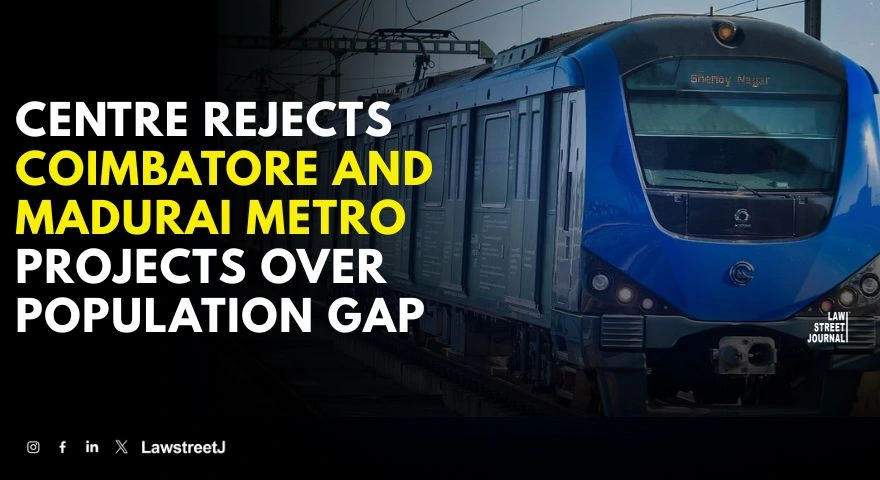New Delhi: The Union Ministry of Housing and Urban Affairs has rejected Tamil Nadu’s proposals to introduce Metro Rail networks in Coimbatore and Madurai, stating that both cities fail to meet the population requirement stipulated under the Metro Rail Policy, 2017. The decision, conveyed in an official letter dated November 14, 2025, has revived debate over the continued use of outdated census data for evaluating major transport projects.
Under the 2017 Policy, a city must have a minimum population of 20 lakh (2 million) to qualify for a Metro system. Central authorities continue to rely on the 2011 Census for this benchmark, as the 2021 data has not yet been released. According to the 2011 Census, Coimbatore had a population of 15.84 lakh, while Madurai recorded 15 lakh—placing both cities below the eligibility threshold. The Ministry highlighted that Tamil Nadu’s Detailed Project Reports (DPRs) had been evaluated strictly on these statutory parameters.
The Ministry further noted that Metro rail systems involve substantial financial commitments and should be sanctioned only where long-term ridership potential, revenue projections, and urban scale justify such investment. It added that in cities with comparatively lower populations, enhanced bus services or Bus Rapid Transit Systems (BRTS) are often more suitable alternatives. The Ministry also referenced the Comprehensive Mobility Plans (CMPs), observing that Madurai’s own CMP had identified BRTS as the more feasible option. Officials clarified that the rejection did not take into account current population estimates or projected urban growth and relied solely on the legally mandated census reference.
Background: Tamil Nadu’s Submissions and Urban Transit Planning
The Tamil Nadu government submitted DPRs and CMPs for the two cities in December 2024 after conducting internal studies on congestion, traffic flow, and mobility needs. The state’s proposal sought to create advanced mass-transit networks beyond Chennai, which currently hosts the only operational Metro in Tamil Nadu.
For Coimbatore, the DPR proposed two Metro corridors spanning roughly 44 km, connecting key commercial areas and integrating with existing rail and bus systems. In Madurai, the plan envisioned a single 32-km corridor serving dense residential and business zones. While acknowledging these planning efforts, the Ministry reiterated that proposals must conform to demographic and policy-based criteria and that population metrics in the DPRs did not satisfy the conditions required for central approval.
The rejection has renewed focus on how rigidly the population benchmark is applied. While the Ministry maintains that the 2-million requirement is mandatory, observers have noted earlier cases where Metro projects were approved in cities with lower populations—raising questions about consistency. Officials, however, emphasize that the continued use of 2011 Census data aligns with existing legal norms and remains the only officially recognized demographic dataset. With the 2021 Census yet to be released, cities experiencing rapid urban growth—such as Coimbatore and Madurai—continue to be evaluated using decade-old numbers.
The Ministry’s decision also reflects a broader shift toward data-driven planning and the need to match infrastructure scale with demographic realities. Tamil Nadu may revisit mobility plans for these cities by strengthening BRTS proposals or expanding bus networks. Another option would be to develop the Metro systems through state funding without central financial support, though such a move would carry significant fiscal implications.
The state may also wait for updated census figures. If new data places Coimbatore or Madurai above the 2-million threshold, the proposals could be reconsidered under the existing Metro Rail Policy. As of November 2025, the Ministry has not indicated any change to the population criterion or its enforcement, nor has it signalled a policy review or flexible thresholds. The rejection therefore reinforces the demographic rules currently governing central approvals for Metro rail development across India.







